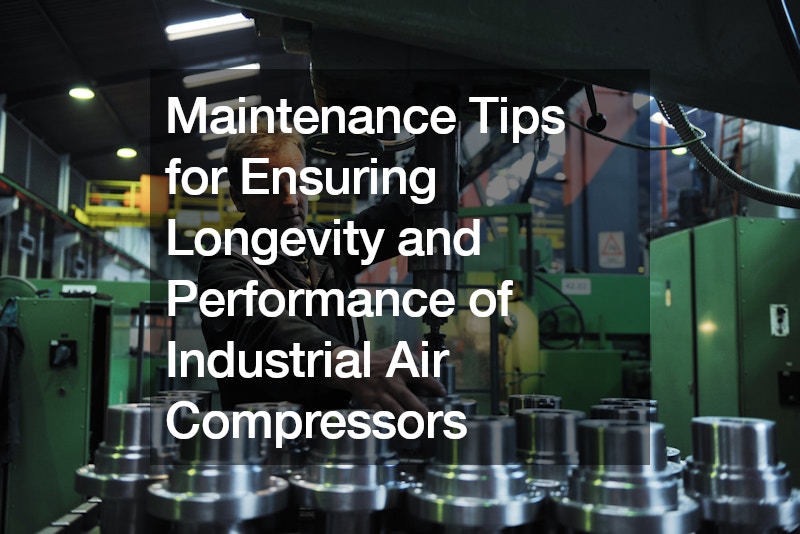Industrial air compressors are critical components in various sectors, powering tools, machinery, and systems essential for manufacturing, construction, and other industrial applications. To ensure these powerful machines operate efficiently and have a long lifespan, regular maintenance is imperative. Proper upkeep not only enhances performance but also prevents costly downtime and repairs.
This article will delve into essential maintenance tips to keep your industrial air compressors running smoothly and efficiently.
Understanding the Importance of Maintenance
Before diving into specific maintenance tips, it’s crucial to understand why maintenance is so vital for industrial air compressors. These machines often operate under demanding conditions, generating significant amounts of heat and pressure. Over time, wear and tear can lead to decreased efficiency, breakdowns, and even complete failure. Regular maintenance helps identify and address potential issues before they escalate, ensuring continuous operation and extending the life of the equipment.
Regular Inspection and Cleaning
One of the simplest yet most effective maintenance practices is regular inspection and cleaning. Dust, dirt, and debris can accumulate on various parts of the compressor, leading to blockages and overheating. Follow these steps for routine inspection and cleaning:
Visual Inspections: Regularly check for any visible signs of wear, leaks, or damage. Pay special attention to hoses, belts, and connections, as these are common points of failure.
Clean or Replace Filters: Air filters play a crucial role in maintaining the purity of the air entering the compressor. Dirty or clogged filters can restrict airflow, reduce efficiency, and increase the risk of contamination. Clean or replace filters according to the manufacturer’s recommendations.
Drain the Tank: Moisture buildup in the compressor tank can lead to corrosion and reduce the tank’s lifespan. Ensure you regularly drain any accumulated moisture from the tank, especially in humid environments.
Lubrication and Oil Changes
Proper lubrication is essential for the smooth operation of moving parts within the compressor. Lubricants reduce friction, minimize wear, and help dissipate heat. Follow these guidelines to maintain adequate lubrication:
Check Oil Levels: Regularly monitor the oil levels in your compressor and top up as necessary. Low oil levels can lead to increased friction and overheating, causing severe damage to the compressor.
Change Oil Regularly: Over time, oil can degrade and lose its effectiveness. Change the oil according to the manufacturer’s recommended schedule to ensure optimal performance and protection of internal components.
Use the Right Lubricant: Ensure you use the correct type of oil or lubricant specified by the manufacturer. Using the wrong type can lead to improper lubrication and potential damage.
Monitor and Maintain the Cooling System
Industrial air compressors generate a significant amount of heat during operation. A well-functioning cooling system is essential to prevent overheating and maintain performance. Consider these tips to keep the cooling system in good condition:
Inspect Cooling Fans and Vents: Ensure that cooling fans and vents are clean and unobstructed. Dust and debris can impede airflow and reduce the cooling system’s efficiency.
Check Coolant Levels: If your compressor uses a liquid cooling system, regularly check and maintain the coolant levels. Low coolant levels can lead to overheating and damage.
Clean Heat Exchangers: Heat exchangers play a crucial role in dissipating heat. Ensure they are clean and free from blockages to maintain efficient heat transfer.
Tighten and Replace Worn Parts
Over time, vibrations and continuous operation can cause bolts, nuts, and other components to loosen. Regularly tightening and replacing worn parts can prevent failures and extend the compressor’s lifespan:
Inspect and Tighten Bolts: Regularly inspect and tighten all bolts, nuts, and screws to ensure they are secure. Loose components can lead to increased wear and potential breakdowns.
Replace Worn Belts and Hoses: Belts and hoses are subject to wear and tear, and their failure can cause significant downtime. Inspect these components regularly and replace them if they show signs of wear, cracking, or fraying.
Monitor Pressure Relief Valves: Pressure relief valves are critical safety components that prevent over-pressurization. Ensure these valves are functioning correctly and replace them if they are not.
Implement a Scheduled Maintenance Program
To ensure consistent and thorough maintenance, implement a scheduled maintenance program tailored to your specific compressor model and usage patterns. This program should include:
Daily Checks: Perform basic inspections, such as checking oil levels and draining moisture from the tank, on a daily basis.
Weekly and Monthly Tasks: Schedule more detailed inspections and maintenance tasks, such as cleaning filters and tightening bolts, on a weekly or monthly basis.
Annual Servicing: Arrange for a comprehensive annual service by a qualified technician to thoroughly inspect and maintain all components of the compressor.
Training and Documentation
Finally, ensure that all personnel responsible for operating and maintaining the compressors are adequately trained. Proper training helps prevent user errors and ensures that maintenance tasks are performed correctly. Additionally, maintain detailed records of all maintenance activities, including dates, tasks performed, and any parts replaced. This documentation can help track the compressor’s condition over time and identify recurring issues.
Conclusion
Regular maintenance is essential for the longevity and performance of industrial air compressors. By following these tips—conducting regular inspections, maintaining proper lubrication, ensuring efficient cooling, tightening and replacing worn parts, implementing a scheduled maintenance program, and providing proper training—you can maximize the efficiency, reliability, and lifespan of your industrial air compressors. A proactive approach to maintenance not only protects your investment but also ensures that your operations run smoothly and efficiently.
.



